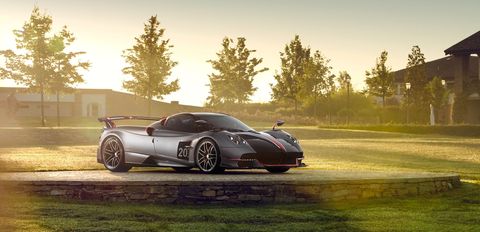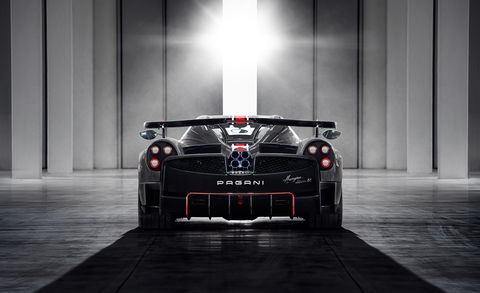Pagani Huayra BC Roadster Is Beautiful Enough to Justify Its $3.4 Million Price

The Pagani Huayra BC roadster will carry a factory-gate price of $3.4 million before local taxes. Even though only 40 will be produced, and they will be the last in the Huayra line, that is a ridiculous amount of money—more than triple what was charged for the first Huayra coupe in 2011.
And yet, we challenge you to spend a couple of minutes looking at these images and say that figure isn’t entirely justified.
In fact, the BC roadster is the finest-looking memorial in the world. Like its coupe sister, named after an Italian-American entrepreneur called Benny Caiola, who was better known among gearheads for having one of the world’s largest collections of Ferraris. When the tiny Italian supercar maker Pagani was starting out, Caiola was the man who placed the first ever order for one of its products. He died in 2010, but Horacio Pagani’s gratitude to his debut customer means his initials have been incorporated into the ultimate version of the Huayra.
While all Paganis are special, some get to be more special than others. The regular Huayra spawned both roadster and dynamically focused BC models, with this last-of-line special being a combination of the two. Roadsters are normally heavier than their fixed-roof sisters, but the Huayra has bucked the trend thanks to the use of an ultralight removable carbon-fiber hard top. The BC roadster is slightly heavier than the BC coupe, but, according to Pagani claims, it weighs just 2756 pounds, 66 pounds less than the regular roadster.
The monocoque structure incorporates even lighter materials than regular carbon fiber, including what we’re told is carbon-titanium HP62, making it both lighter and stronger. Lower body aero elements and the vast rear wing work together to produce a claimed peak of 1102 pounds of downforce at 174 mph. In addition to movable active elements, the titanium exhaust incorporates flaps in the catalytic converters to divert exhaust gases over the underfloor elements like a Formula 1 car’s blown diffuser. The exhaust pipes still use the two-by-two quad layout that Pagani pioneered with the original Zonda.
Many parts of the interior are closer to art than automotive design, with details like the gorgeous exposed metal gear selector showing the obsessive attention to detail of company founder and chief designer Horacio Pagani. It would have been so much easier to give the car a more conventional shifter, but so much less stylish. The seats also incorporate a deep slash in their backrests, presumably to enhance occupant cooling when the car is being driven in direct sunlight.
As in other versions of the Huayra, power comes from a uniquely tuned version of the Mercedes-AMG M158. This twin-turbocharged V-12 makes 791 horsepower and accompanies it with 775 lb-ft of torque available from 2000 rpm to 5600 rpm. Drive is delivered to the rear axle through a seven-speed single-clutch automated gearbox. Pagani hasn’t released acceleration claims—we doubt they would be tardy—but does say that the car can generate up to 1.9 g’s of continuous lateral acceleration during hard cornering, with face-distorting peaks of up to 2.2 g.
While we’re told that the BC roadster is the ultimate Huayra, there’s no guarantee it will actually be the last one. Horacio Pagani has always found it difficult to say no to the demands of his customers, with the company’s original Zonda kept in limited production for years as affluent buyers, including F1 driver Lewis Hamilton, begged for the chance to buy one. Horacio admits that plans to retire the Huayra with the BC roadster might slip.
“It is scheduled to be the last production model,” he told us at the Goodwood Festival of Speed, “but I am also listening to some private collectors who are asking maybe for a one-off or a limited edition, which will probably extend the life span a little more.”
By: Mike Duff, July 31, 2019
For more cars, visit: https://www.caranddriver.com/news/a28552297/pagani-huayra-bc-roadster-photos-info/
Source: https://www.caranddriver.com/

